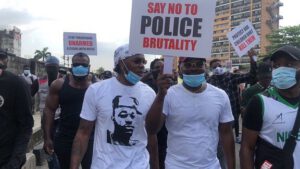
Although there is a motion picture which features the inimitable Hollywood star, Eddie Murphy, with the above title, this article is however not inspired by that movie. Rather, it centres around the real life experiences of many Nigerians over the last two weeks.
Except, perhaps, the Nigerian civil war years, which saw life and living atrophied, nothing else compares with the orgy of violence which swept across virtually all states of the country like a whirlwind, blowing a miasma of death, destruction and looting along its pathways.
Quite unlike the riots which attended the Structural Adjustment Programme (SAP) of the Ibrahim Babangida regime in 1987, and the street marches engendered by the annulment of the June 12, 1993 presidential election, nothing, in recent memory, prepared Nigerians for the public revolt recently witnessed in the country.
What started out as a peaceful protest against the highhanded police formation, the Special Anti-Robbery Squad (SARS), and a benign demand for overall reforms in the Nigerian Police, was to unwittingly spiral out of control after the authorities introduced underhand tactics in trying to address the agitations. This, they did, first by ‘importing’ thugs and other miscreants to infiltrate the ranks of the #endSARS protesters; and later allowing persons in Army uniform shoot at a group of unarmed civil campaigners at the Lekki toll plaza, Lagos.
For an administration that had shown solidarity with the protesters, acceding almost immediately to the demand to scrap the ignoble SARS formation, the Tuesday, October 20, 2020 dusk shooting soon became a turning point.
Like a genie long bottled up, youths from across the land burst loose. And ever since, normalcy is yet to fully return.
Instead, what appears to be a new normal is a systematic recourse to ‘search, loot, pillage and burn’ both public and privately owned businesses and homes.
While it is seemingly clear that genuine protesters under the aegis of #endSARS are not involved in the wave of wanton destruction seen so far, the derisive attempt to wave off what is obviously a peoples revolt as the actions of mere looters can easily lead a beleaguered nation to miss the most important lessons of the times.
Only last week, across several social media platforms, a message which indicated a clear misreading of the crisis we are enmeshed in as a country stood out like a sore thumb. It proclaimed: ” No single bookshop has been looted in any state of the federation because looters don’t read, and readers don’t loot.”
Really? At first glance, anyone, including me, would be inclined into believing the post, especially given its humorous rhyme. But upon deeper reflection, one would readily discover the raison d’ etre for the current uprising.
Ponder, for instance, the claim that readers don’t loot. If ,indeed, the learned don’t loot, then our dear fatherland ought to have become an eldorado long before the angry youths of today were born.
In deed, those who plunder Nigeria’s resources are the educated. Many of them with first, doctorate and honorary degrees in lootocracy. Else, they won’t be occupying the offices they hold, either as public officials or elected ‘representatives’.
And they litter every facet of our public life: the presidency, legislature, judiciary, and MDAs(ministries, departments, and agencies). Even across the states, it is in the books that they read that they all learnt how to cook the books. While those who ought to be civil servants do violence to the rules, those who are elected by the people transform into private overlords.
Conversely, those who currently loot everything in sight, including stealing entire state capitals by confiscating its signposts, are also lettered. But against the grain of widely believed notion that they are mere thugs, I submit that many of those stomping the streets, in search of palliatives which ordinarily belong to them, are not altogether nitwits.
As a matter of fact, it takes only lettered fellows to know when their rights have been trampled upon. And to wit, discover and expose hidden ‘treasures’ stowed away in nondescript warehouses.
Former President, Association of Nigerian Authors(ANA), poet and polemicist Odia Ofeimun captured it succinctly in 2008 when he penned the immortal lines, ” I will ask questions with stones if they take my voice”.
Haven’t we, as a nation, long shut the voices of our endangered youth population, so cruelly that they have had to resort to seeking respite by throwing stones?
As a matter of fact, our angry youths, whether operating as street urchins or lettered but jobless citizens appear to have traded places with our political elite – by seeking to loot on the streets that which they can’t get in well appointed offices.
Nothing else, perhaps, brings this reality home as the youth response to the amnesty offered suspected looters by Osun State Governor, Adegboyega Oyetola.
Speaking in Osogbo, the state capital after a tour of some devastated parts of the state, Governor Oyetola had warned those who participated in the mayhem to return stolen items within a 72-hour window, or be made to face the full wrath of the law thereafter.
Using the instrumentality of social media handles, some youths of the state fired back, offering amnesty to political office holders who return, within 48 hours, ill-gotten wealth to the nearest branch of the Central Bank of Nigeria (CBN).
Given this obvious ding dong, isn’t it, therefore, time to provide answers to the probing questions of nationhood, which our youths earnestly seek? One of which is offering all citizens equal access to realise their God-given potentials.
Is this too much for a badgered citizen to ask of the fatherland?